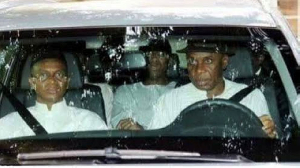As the country celebrates Democracy Day in honour of the winner of the June 12 presidential election, Moshood Abiola, ‘TANA AIYEJINA’ writes about the lasting sports legacy left behind by the late politician
During an interview in 1992, after he was inducted into the African Football Hall of Fame and honoured by the Confederation of African Football with an Order of Merit in Gold award, the continental football body’s highest honour, the late Chief Moshood Abiola sounded prophetic towards the end of his interactive session with the journalists.
“Only Nigeria refused to honour me, but I’m sure they will do that one day,” Abiola stated.
“The whole of Africa has done so, what else do I want?”
He would go on to win the June 12, 1993 presidential election, widely acclaimed as the fairest election ever held in the country.
However, Abiola never became President of Nigeria after the military junta, led by General Ibrahim Babangida, denied him the honour by annulling the poll.
He was then imprisoned by the Gen Sani Abacha regime after he declared himself president in 1994. He eventually died in custody July 7, 1998 aged 60, while fighting for his mandate.
After his demise, remembrance events have been arranged across Nigeria in his name, with June 12 declared Democracy Day and a national holiday in the country.
Several public facilities have also been renamed after him — the MKO Abiola Stadium, Abeokuta in his home state of Ogun and the Moshood Abiola National Stadium, Abuja the most prominent.
To the Nigerian sports enthusiast and those who knew the man Abiola, he was a sports lover, who gave everything for the development of the sector in the country.
A successful businessman, publisher, politician and philanthropist per excellence, Abiola’s love for sports and his contributions to the sector during his lifetime is unquantifiable.
And 25 years after his demise, it has been unmatched by any individual.
The sportsman
Unknown to many, Abiola, who came from a humble background, was an athlete and won the All Nigeria School Athletics Championship and the middleweight amateur boxing title during his teenage years.
This, perhaps, spurred his interest in almost all areas of sports after he became a successful businessman.
As an amateur boxer himself, he was a staunch supporter of the sport, with the International Amateur Boxing Association making him a member of its World Business Commission.
His hand of benevolence also stretched to swimming and athletics, as he singlehandedly sponsored the Asekun National Swimming Competition and the then AAA Junior Athletics Championships, among others.
He was the chairman of the committee that raised funds for Team Nigeria for the Los Angeles Olympics in 1994.
The funds raised were more than enough, with the remaining money used to build the gymnasium at the National Stadium, Lagos.
He was also Chairman, Presidential Monitoring Committee for the Nigeria 1999 FIFA U-20 World Cup.
Football lover
Late Abiola bankrolled three football clubs — ITT FC of Lagos, Abiola Babes of Abeokuta and Concord FC of Lagos — during his lifetime.
Indeed, Abiola Babes became the country’s most glamorous football clubs of the 1980s, rising from the third division to the Nigerian topflight league, and winning the FA Cup twice in 1985 and 1987.
The team had in their ranks at that time an assemblage of some of Nigeria’s finest footballers ever, including Muda Lawal, Rashidi Yekini, Best Ogedengbe and Yisa Sofoluwe, all four now late, and the likes of Friday Ekpo, Toyin Ayinla, Dominic Iorfa, to name a few.
They became a model for club football administration in the country.
All for Babes
Abiola staked everything, including his life, for the success of his club.
His unpleasant experience, when he encountered a drunk bus driver and escaped gun shots from armed robbers, while on a trip with the club for a Cup Winners Cup quarter-final engagement against Zambia’s Nchanga Rangers in 1987, readily comes to mind.
Soccer News of Monday, 12 June 2023
Source: www.punchng.com













